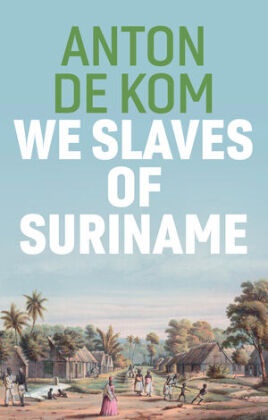Read more
Anton de Kom's We Slaves of Suriname is a literary masterpiece as well as a fierce indictment of racism and colonialism. In this classic book, published here in English for the first time, the Surinamese writer and resistance leader recounts the history of his homeland, from the first settlements by Europeans in search of gold through the era of the slave trade and the period of Dutch colonial rule, when the old slave mentality persisted, long after slavery had been formally abolished.
159 years after the abolition of slavery in Suriname and 88 years after its initial publication, We Slaves of Suriname has lost none of its brilliance and power.
List of contents
Translator's Note
Introductions
Frimangron by Tessa Leuwsha
The Breath of Freedom by Duco van Oostrum
Why Anton de Kom Still Inspires Generation after Generation by Mitchell Esajas
Foreword by Judith de Kom
We Slaves of Suriname
"Sranan," our fatherland
The era of slavery
The arrival of the whites
El Dorado
The first settlements
The Dutch regime
The slave trade
The market
Enslaved
The slave woman
The masters
The punishments
The History of Our Nation
Van Aerssen van Sommelsdyck (1683-1688)
The brutes
The forest expeditions
Johan Jacob Mauricius (1742-1751)
Governor Crommelin (1752-1768)
Governor Nepveu (1770-1779)
Buku (decayed into dust)
The final chapter for the resistance
Suriname under British rule
The great fire
The fate of the ethical
White settlement
Fighting the current
Governors on parade
The abolition of slavery
Freedom?
The great sellout
The era of freedom
How we live
The essence of autonomy
Fin de siècle
Indentured labor
Free labor
In search of gold
The major crops
What becomes of those millions?
Results
Reunion and farewell
Notes
Glossary of Surinamese terms
Index
About the author
Anton de Kom was a leading advocate of Surinamese independence from Dutch colonial rule. Born in Paramaribo, Suriname, on February 22, 1898, he was banished by the colonial authorities in 1933; he wrote
We Slaves of Suriname from exile in the Netherlands, where it was first published in 1934. When World War II broke out, De Kom joined the Dutch resistance; he was arrested by the Germans in 1944 and deported to the Neuengamme concentration camp, where he died on April 24, 1945. In June 2020, Anton de Kom was added to the Dutch national core curriculum for history education (the Canon of the Netherlands) because of his central role in opposing racism and colonialism.
Summary
Anton de Kom's We Slaves of Suriname is a literary masterpiece as well as a fierce indictment of racism and colonialism. In this classic book, published here in English for the first time, the Surinamese writer and resistance leader recounts the history of his homeland, from the first settlements by Europeans in search of gold through the era of the slave trade and the period of Dutch colonial rule, when the old slave mentality persisted, long after slavery had been formally abolished.
159 years after the abolition of slavery in Suriname and 88 years after its initial publication, We Slaves of Suriname has lost none of its brilliance and power.
Report
A New Statesman Book of the Year
Selected as a Best Book of 2022 by Public Books
"one of the most important works of twentieth-century anticolonial literature."
LSE Review of Books
"De Kom is to Suriname what Mandela is to South Africa: a heroic patriot, an advocate of the oppressed, and a symbol of resistance against colonialism."
Unherd
"Heart-breaking... he succeeds in bringing to painful life the savagery of what is now widely considered the most vicious colonization project ever."
New Internationalist
"Almost ninety years after its first appearance, We Slaves of Suriname is still an exemplary description and analysis of Suriname's history, which has not lost its power of expression. From micro to macro situations, De Kom displays phenomenal psychological insight and an acute sense of the driving forces of class and race."
Gloria Wekker, Professor Emerita, Utrecht University
"We Slaves of Suriname is both an analysis of Suriname's postcolonial predicament and an insurgent commentary on the archives of Dutch writing about Suriname... By interrogating the crater left by colonialism in the landscape of modernity, De Kom produces a text that speaks, avant la lettre, directly to postcolonial concerns."
Postcolonial Studies Journal
"An astounding work of lyrical fury ... De Kom is a towering radical and anticolonial figure, and this book a painful masterpiece."
China Miéville, New Statesman
"a classic of anticolonial Black leftist thought"
Public Books

